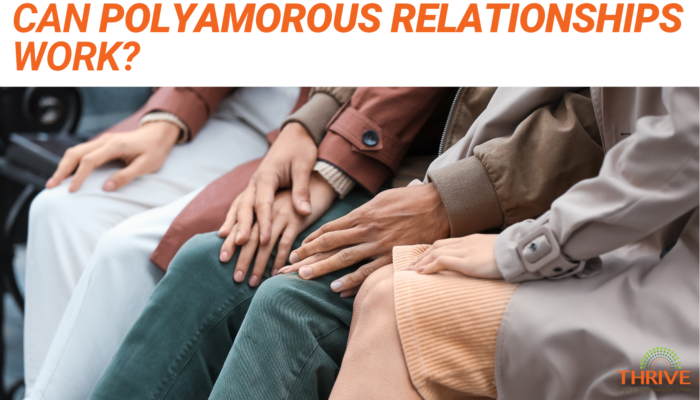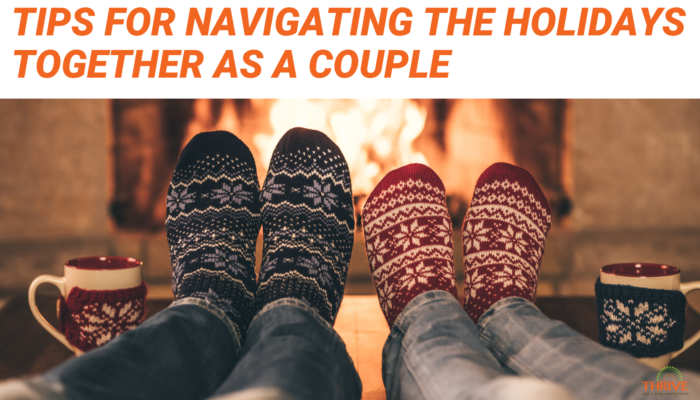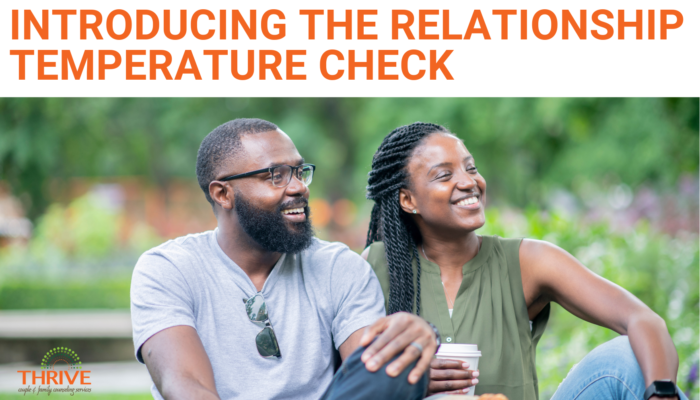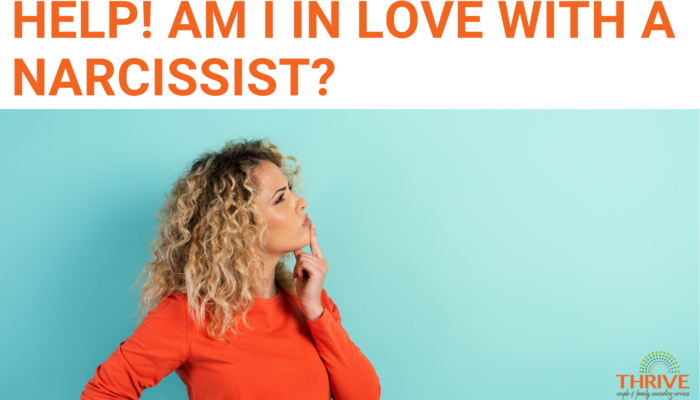Being in a romantic relationship, no matter how you structure it, can be complicated!
Any relationship requires us to work at practicing good communication and demonstrating an ongoing commitment to working through challenges. Though monogamy is the most common relationship structure in our society, polyamorous relationships have existed for thousands of years. In our modern world, more and more people are interested in exploring polyamory or consensual non monogamy (CNM). Just like with monogamous relationships, people can use attachment theory and Emotionally Focused Therapy to improve polyamorous ones too.
There is no such thing as a perfect relationship structure. What works for one relationship wouldn’t for another or the people in them, and that’s okay.
Lots of people may have preferences, faith based values, or family beliefs around monogamy. As relationship therapists, we always support the world view of our clients and follow their lead, never interjecting our own personal values or choices. We share this information to provide information for the curious, and to help all of us be aware of the diverse fabric that makes up our big, human family.
It’s common to doubt that polyamorous relationships can work when monogamous relationships are what most people are used to. There’s a typical assumption from monogamous people that non-monogamous relationships are inherently unstable or uncommitted, which is not necessarily the case.
There are many non-monogamous folks who are extremely committed to their partners and non-monogamy isn’t inherently unstable. There are also some who may believe that non-monogamy is a cure-all for relationship problems, which is also definitely not the case. All relationships take work and all relationship styles have problems. Polyamorous relationships can absolutely work, but they do take lots of communication and self-reflection.
“Even thinking about polyamory is painful or upsetting to me”
We want to validate that non-monogamy, including polyamorous relationships, can sometimes be difficult to think about, for good reasons. People can have painful family histories where a parent had an affair, which led to divorce and forever changed their families. Those recovering from affairs can also be especially tender around suggestions of polyamory.
It feels important to distinguish that consensual non-monogamy is consensual and secure and therefore, entirely different from the secrecy and relationship insecurity and existential threats that usually result from affairs.
If you’ve been cheated on in the past, it can be upsetting to think about someone being in relationships with more than one person. Open relationships might remind you in a distressing way of the betrayal you experienced. It makes a lot of sense that you feel this way, and it doesn’t mean that you’re not open-minded or inclusive. It can be helpful to learn more about non-monogamous relationships to help you affirm what works best for you and to take away the fear of the unknown that non-monogamy often brings up.
Is non-monogamy cheating?
It’s a common assumption that when someone has more than one partner, they are “cheating.” However, non-monogamy is often practiced in a way that’s consensual.
Most people who identify as polyamorous work very hard to communicate with their partners and agree to structures and behaviors that everyone consents to.
Polyamory doesn’t mean anything goes either, and people in poly relationships can experience betrayals like anyone else. What constitutes cheating in a poly relationship varies from relationship to relationship. When those boundaries and agreements are broken, it causes damage to trust that has to be repaired.
How prevalent are non-monogamous relationships?
According to a 2018 study in the United States, 11% of adults report being non-monogamous, at least at some point in their adult lives. People in the poly community can have deeply explored and held values around non monogamy in their lives, and most do not take their relationships and the care of them lightly.
How to be More Inclusive of All Relationship Types
In recent years, there seems to be more awareness and conversation occurring about different ways that romantic relationships can appear. People who aren’t in monogamous relationships are in the minority.
In some areas of the world, partners feel like they have to hide their relationship from the public to avoid criticism, harassment, or even violence against them. Practicing inclusivity of all relationship types and structures allows people in minority relationships feel like they are welcome to be themselves.
You don’t have to agree with an identity or lifestyle, or want to pursue it yourself, to be inclusive. You just have to accept that other people do have that lifestyle and not try to change who they are.
Steps to become more inclusive of all relationship types:
Learn about non-monogamy
The first way to start being inclusive is to be aware of the different kinds of relationships, as well as knowing what each kind of relationship looks like.
-
The first, and most common, kind of relationship is a monogamous relationship.
In monogamous relationships, two partners agree to be with each other exclusively with no other romantic or sexual partners. Any deviation from this relationship is considered infidelity.
-
The second kind of relationship is a non-monogamous relationship.
Relationships with multiple partners might make you think of polygamy, which is when someone is married to more than one person. Most commonly, a polygamous relationship is when a man has more than one wife. However, polygamy is often not a term that non-monogamous people use or identify with since it both refers to marriage (which is legally only allowed between two people) and often has negative connotations.
-
In general, a non-monogamous or open relationship is where one person has multiple relationships at the same time, with the knowledge and consent of everyone involved.
Some non-monogamous people are only interested in casual or sexual relationships, and others are looking for committed relationships. There are many different ways people structure non-monogamous or open relationships.
-
Polyamory specifically refers to the practice of forming multiple deep emotional connections with multiple partners.
There may be different roles for different partners, even if all of the relationships are committed. For example, someone in a polyamorous relationship might have one partner that they raise kids with, one partner for sex, one partner for spiritual connection, and so on.
Some people practice hierarchical polyamory, where they have a primary relationship, and then have a secondary or other non-primary relationship in addition to that. This style works for some people, and others are uncomfortable with the idea of ranking certain relationships as more important.
Other folks practice non-hierarchical polyamory, where all relationships are given equal importance. Sometimes partners who live together are referred to as “nesting partners” instead of as primary partners in this context. There’s also solo polyamory, where someone has multiple partners but doesn’t live with any of them.
-
What about swinging?
Swinging is another type of non-monogamous relationship. If people are in a swinging relationship, they engage with other people or partners for sex or pleasure, although they aren’t necessarily “in a relationship” with that person. One of the most common forms of swinging is a couple that swaps sexual partners. There are clear boundaries and agreements between all people involved.
Don’t Make Assumptions
Once you are aware of the different ways relationships can present themselves, it’s helpful to keep your biases and assumptions in check to avoid excluding others. For example, if a woman is telling a story about her partner, it would be very easy to ask her questions about her boyfriend or use the pronoun “he.” If this woman was in a relationship with another woman, an easy mistake like this could be marginalizing.
It might not seem like a big deal, but one of the most distressing aspects of living as a marginalized person is dealing with constant microaggressions.
A microaggression is “a comment or action that subtly and often unconsciously or unintentionally expresses a prejudiced attitude toward a member of a marginalized group.” Experiencing a regular stream of comments and actions that reinforce the idea that you’re not normal or that there’s something different about you can be exhausting, infuriating, dehumanizing, and painful.
Similarly, it is a common assumption that people in non-monogamous relationships aren’t as committed as those who are. This is not the case! Rather than making assumptions, ask questions out of curiosity to make sure that your understanding of someone else’s relationship is actually true.
Be Respectful
Stigma is the biggest challenge that people report facing once others find out that they are non-monogamous. One of the most direct ways to marginalize other people is by being disrespectful. Some people are blatantly disrespectful, but others do so in a more subtle way, or even accidentally.
No matter the intention, disrespect against marginalized groups is painful and unwelcome. Understanding that non-monogamous relationships are just as valid as monogamous relationships is essential.
The three most common fears of people in minority relationships are judgment, pressure to change, and violence. Being respectful of people who are in relationships that are different from yours is something you can easily do to put others at ease.
Being respectful doesn’t mean that you have to agree with someone else’s life. You don’t have to have a non-monogamous relationship if you don’t want to! Being respectful means that you give others the freedom to make their own choices without condemning them.
Educate & Be Educated
If you are in a non-monogamous or minority relationship, one way that you can help create more inclusivity is by educating patiently if you have the capacity to. Even if you’re not in a minority relationship, once you’ve learned more about them you can use your knowledge to educate others. This is especially helpful so folks in minority groups don’t have to take on the burden of educating others alone.
Anyone can educate about and advocate for more inclusivity and awareness about the different ways that relationships can appear! Educating others without judgment and condemnation is a great way to start opening minds and initiating more knowledge, inclusivity, and respect.
Being open to other kinds of relationships is important to be inclusive and to help people feel comfortable being themselves. Get curious and ask questions. Be polite and respectful. Don’t assume that everyone is monogamous. And most importantly, pass the information along to other people.
Couples therapy can help relationships of all structures
Attachment-based therapy modalities, like Emotionally Focused Therapy, can be helpful to relationships of all structures, both monogamous and non-monogamous. Understanding how you tend to relate to the attachment figures in your life, like your romantic partners, can help you find new ways to build connections that bring you closer together.
As relationship therapists, we don’t ever have an agenda around relationship structures. While we work hard to be inclusive and understanding of all relationship types and structures, we never bring up any kind of relationship structure as a solution to relationship problems, because they may not be what a person chooses or values. They are also certainly not a quick fix to a distressed relationship. Deciding on what kind of relationship structure works best for you is intensely personal, and will always be respected by your therapist.


 Hello, I’m Emma Abel Loach.
Hello, I’m Emma Abel Loach.

